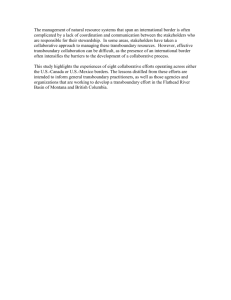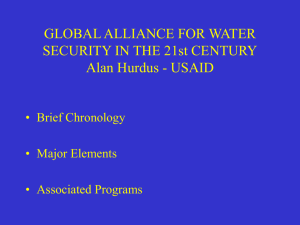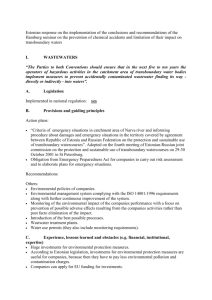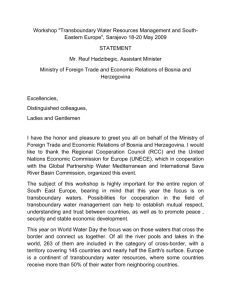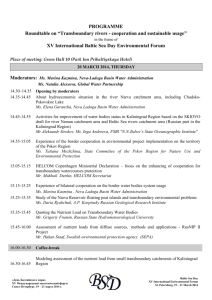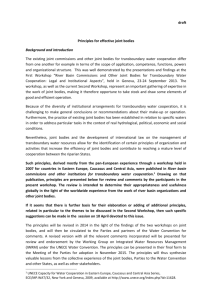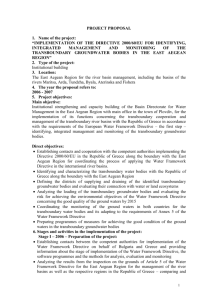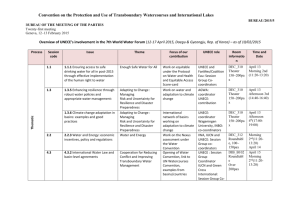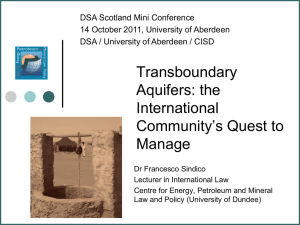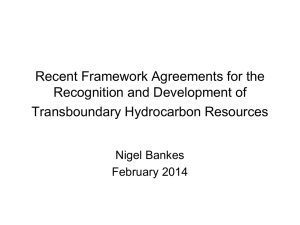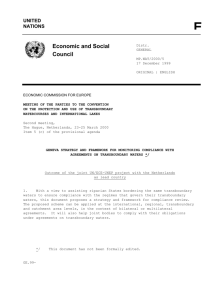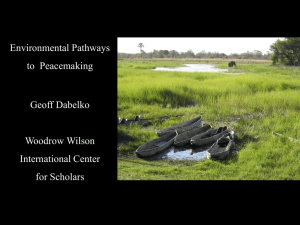Identifying, quantifying and communicating the benefits of
advertisement
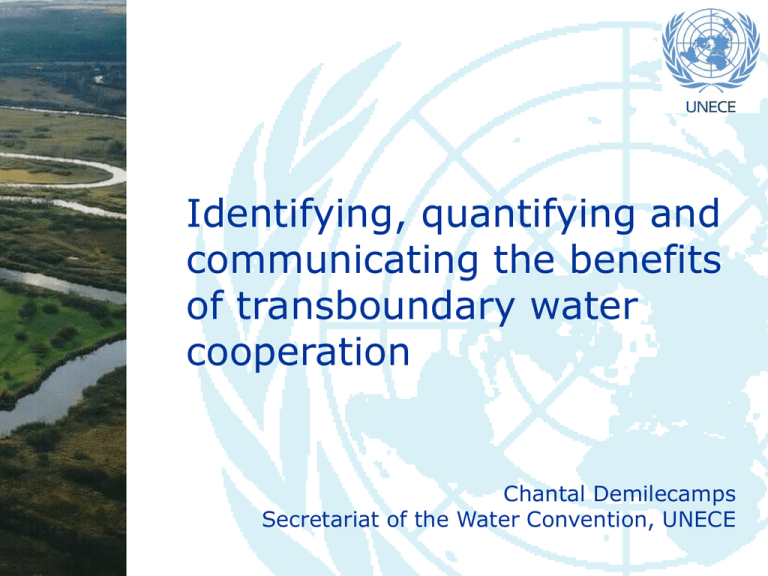
Identifying, quantifying and communicating the benefits of transboundary water cooperation Chantal Demilecamps Secretariat of the Water Convention, UNECE Transboundary cooperation under the Water Convention • Protection of transboundary waters by preventing, controlling and reducing transboundary impacts • Reasonable and equitable use of transboundary waters • Obligation to cooperate through agreements and joint institutions => Objective: sustainable water management, looking at economic, social & environmental dimensions of water Identifying, quantifying & communicating the benefits of transboundary cooperation • Background Limited scope of cooperation Willigness to cooperate depends on perception of potential benefits Need for more qualitative & quantitative data on benefits • Objectives Support countries to understand and estimate the full range of potential benefits of transboundary water cooperation Encourage the broadening of cooperation Identifying, quantifying & communicating the benefits of transboundary cooperation • Methodology Development of a Policy Guidance Note on Identifying, Quantifying and Communicating the benefits of cooperation • Activities – Expert framing workshop (June 2013) – Workshop to gather & share experiences (22-23 May 2014) – Expert Workshop to finalize the policy guidance note and discuss next steps (Nov. 2014, tbc) Contribute to the development of the Policy Guidance Note Share experience during the Workshop in May 2014 Structure of the Guidance Note • • • • • Executive Summary Ch1 – Setting the Context Ch2 – Identifying benefits Ch3 – Quantifying benefits Ch4 – Maximizing the policy impact of benefit assessment • Technical annexes DRAFT TYPOLOGY OF BENEFITS I. Benefits for the transboundary waters Environmental benefits (avoided habitat degradation and biodiversity loss) II. Benefits from the transboundary waters Improved human satisfaction (recreation, cultural values), improved health (reduced water-borne diseases), and direct economic benefits (increased economic production in sectors, reduced costs of carrying out productive activities, avoided losses from floods & droughts, increased value of properties) as a consequence of managing water better III. Benefits thanks to the transboundary waters • Reduced costs (managing water, complying with treaties, defense spending) and improved benefits (in other policy areas) as a consequence of building trust between countries IV. Benefits beyond the transboundary waters • Economic growth and poverty reduction generated by more cross-border investment and open markets for goods, services and labor (as a second order consequence of direct economic benefits and increased trust) Challenges of the work on benefits of cooperation • Need to build on existing knowledge and to bridge science and policy • Need to develop a policy-makers oriented guidance note, based on concrete experience (GEF projects) • Not all benefits can be valued: qualitative and quantitative information • Many tools and methodologies available for economic valuation, to be communicated in an easy way to influence the policy process • High request to develop guidance on valuation of benefits related to trust building Which benefits of transboundary water cooperation have you identified in your project? DRAFT TYPOLOGY OF BENEFITS I. Benefits for the transboundary waters Environmental benefits II. Benefits from the transboundary waters Consequences of managing water better, direct economic benefits III. Benefits thanks to the transboundary waters Consequences of building trust between countries IV. Benefits beyond the transboundary waters Economic growth and poverty reduction generated Have some benefits of transboundary water cooperation already been quantified? (in a qualitative or quantitative way) In your projects, have benefits of transboundary water cooperation been communicated to influence the policy process? How? How could we better communicate the benefits? How can the assessment of benefits be integrated into the policy process? Thank you! More information http://unece.org/env/water On the activities on quantifying the benefits of transboundary cooperation http://www.unece.org/env/water/ benefits_cooperation.html Chantal.Demilecamps@unece.org
